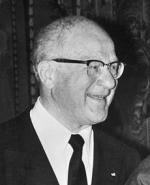Disable ads!
Avery Brundage
Avery Brundage (/ˈeɪvri ˈbrʌndɨdʒ/; September 28, 1887 – May 8, 1975) was the fifth president of the International Olympic Committee (IOC), serving from 1952 to 1972. The only American to attain that position, Brundage is remembered as a zealous advocate of amateurism, and for his involvement with the 1936 and 1972 Summer Olympics, both held in Germany. Brundage was born in Detroit in 1887 to a working-class family; when he was five years old, his father moved his family to Chicago and subsequently abandoned his wife and children. Raised mostly by relatives, he attended the University of Illinois to study engineering and became a track star. In 1912, he competed in the Summer Olympics, contesting the pentathlon and decathlon, but did not win any medals; both events were won by Jim Thorpe. He won national championships in track three times between 1914 and 1918, and founded his own construction business. He earned his wealth from this company and from investments, and never accepted pay for his sports involvement. Following his retirement from athletics, Brundage became a sports administrator, rising rapidly through the ranks in United States sports groups. As leader of America's Olympic organizations, he fought zealously against a boycott of the 1936 Summer Olympics, which had been awarded to Germany before the rise of its Nazi government and its subsequent, escalating persecution of Jews. Although Brundage was successful in getting a team to the Games in Berlin, its participation was controversial, and has remained so. Brundage was elected to the IOC that year, and quickly became a major figure in the Olympic movement. He was elected IOC president in 1952. As president, Brundage fought strongly for amateurism and against commercialization of the Olympic Games, even as these stands came to be seen as incongruous with the realities of modern sports. His final Olympics as president, at Munich in 1972, was marked by controversy: at the memorial service following the murder of 11 Israeli athletes by terrorists, Brundage decried the politicization of sports and, refusing to cancel the remainder of the Olympics, declared "the Games must go on". Although Brundage's statement was applauded by those in attendance, his decision to continue the Games has since been harshly criticized, and his actions in 1936 and 1972 seen as evidence of anti-Semitism. In retirement, Brundage married a German princess; he died in 1975.
 Read more on wikipedia.org Read more on wikipedia.org
 All quotes by Avery Brundage All quotes by Avery Brundage
 Edit Edit
|

|
|
|
|
|
Background photo by Giuliana
|